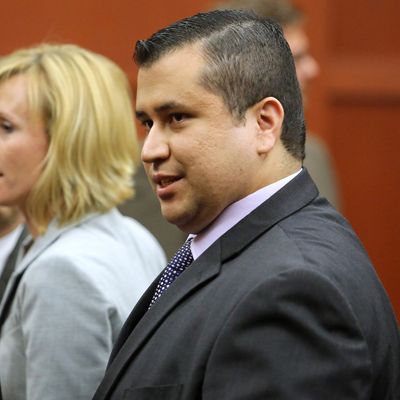
Since George Zimmerman was found not guilty on Saturday night in the killing of Trayvon Martin, the rest of America has been quick to heap scorn and blame on Florida, a state that has gained something of a reputation for poor decisions, legal and otherwise. But the verdict is not actually Florida’s fault.
Many have noted that Florida law puts the burden of proof on the prosecution to show beyond a reasonable doubt that Zimmerman was not acting in self-defense, as opposed to forcing Zimmerman to prove beyond a reasonable doubt that he was — a tall order when witness accounts are piecemeal and conflicting. That is, indeed, Florida law. But it’s also the law in 49 other states — every one except Ohio. As law professor Eugene Volokh wrote yesterday:
[O]n this point, Florida law is precisely the same as in nearly all other states: In 49 of the 50 states, once the defense introduces any evidence of possible self-defense, the prosecution must disprove self-defense beyond a reasonable doubt.
It hasn’t always been this way. “Over the last several decades the individual states shifted from treating self-defense as a traditional affirmative defense (along the lines of an alibi defense), and more in the current manner (in which the burden of persuasion shifts to the State),” says Andrew Branca, a Massachusetts attorney and the author of the book The Law of Self Defense.
However, this is an appropriate way for the justice system to handle claims of self-defense, says famed Harvard Law professor Alan Dershowitz. “The burden of proof should always be on the prosecution and doubts should be resolved in favor of innocence, even when based on self-defense,” he tells Daily Intelligencer.
Florida’s controversial Stand Your Ground law — which, in a nutshell, says you can meet force with force without trying to retreat first — is somewhat more unique, but not really, as at least 30 other states have adopted similar laws. However, despite many news reports to the contrary, Stand Your Ground never came into play during the trial. Zimmerman’s story is that he was attacked while engaged in a lawful activity, and protected himself with necessary force while being pummeled on the ground by Martin. His legal defense would have been the same whether or not Stand Your Ground was ever enacted
Simply put, there’s just nothing strange or novel about Florida law with respect to this case. Diana Tennis, an attorney in Orlando who has handled criminal defense cases for nearly 18 years, tells us, “I believe we would have had the same result based on this evidence in any state.”
Florida may be blameless when it comes to the jury’s decision itself. But one could certainly make the argument that the state’s laws helped lead to the confrontation that left Martin dead. Take Stand Your Ground. On that rainy night in Sanford, Zimmerman was armed with the knowledge that, if the hooded figure he decided to follow turned violent, Stand Your Ground granted him extra leeway to use force to defend himself. Furthermore, Zimmerman surely would have been more hesitant to pursue Martin in the first place had he not had the confidence that comes with carrying a concealed firearm. Florida is one of 38 “shall issue” states in which pretty much anyone who wants a concealed-carry license is granted one. In fact, last December, Florida became the first and only state in the country to issue at least 1 million concealed-carry permits.
Stand Your Ground and permissive concealed-carry laws are certainly not unique to Florida, but transport the same situation to, say, New York, and Trayvon Martin might still be alive today. Florida law may not have helped to keep Zimmerman out of prison, but it probably helped him out of that car.





























